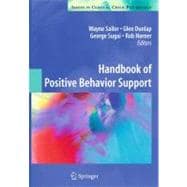
| Foreword | p. v |
| Introduction | |
| Overview and History of Positive Behavior Support | p. 3 |
| The Intellectual Roots of Positive Behavior Support and Their Implications for Its Development | p. 17 |
| Early Childhood, Family, and Community | |
| Positive Behavior Support and Early Intervention | p. 49 |
| Toward an Ecological Unit of Analysis in Behavioral Assessment and Intervention With Families of Children With Developmental Disabilities | p. 73 |
| Positive Behavior Support and Early Intervention for Young Children With Autism: Case Studies on the Efficacy of Proactive Treatment of Problem Behavior | p. 107 |
| Integrating a Positive Behavior Support Approach Within Head Start | p. 125 |
| Empirically Supported Intervention Practices for Autism Spectrum Disorders in School and Community Settings: Issues and Practices | p. 149 |
| A Programwide Model for Supporting Social Emotional Development and Addressing Challenging Behavior in Early Childhood Settings | p. 177 |
| Integrating PBS, Mental Health Services, and Family-Driven Care | p. 203 |
| Optimistic Parenting: Hope and Help for Parents With Challenging Children | p. 233 |
| Families Facing Extraordinary Challenges in Urban Communities: Systems-Level Application of Positive Behavior Support | p. 257 |
| Delivering Behavior Support in the Foster Care System | p. 279 |
| Schoolwide | |
| Defining and Describing Schoolwide Positive Behavior Support | p. 307 |
| Sustainability of Systems-Level Evidence-Based Practices in Schools: Current Knowledge and Future Directions | p. 327 |
| Increasing Family Participation Through Schoolwide Positive Behavior Supports | p. 353 |
| Primary-Tier Interventions and Supports | p. 375 |
| Secondary-Tier Interventions and Supports | p. 395 |
| Function-Based Supports for Individual Students in School Settings | p. 421 |
| Implementation of Schoolwide Positive Behavior Support in Urban Settings | p. 443 |
| Positive Behavior Support in Alternative Education, Community-Based Mental Health, and Juvenile Justice Settings | p. 465 |
| Behavior Supports in Nonclassroom Settings | p. 497 |
| Facilitating Academic Achievement Through Schoolwide Positive Behavior Support | p. 521 |
| Using a Problem-Solving Model to Enhance Data-Based Decision Making in Schools | p. 551 |
| Finding a Direction for High School Positive Behavior Support | p. 581 |
| Systems Change and the Complementary Roles of In-Service and Preservice Training in Schoolwide Positive Behavior Support | p. 603 |
| New Directions | |
| Sustaining Positive Behavior Support in a Context of Comprehensive School Reform | p. 633 |
| Completing the Continuum of Schoolwide Positive Behavior Support: Wraparound as a Tertiary-Level Intervention | p. 671 |
| Implementing Function-Based Support Within Schoolwide Positive Behavior Support | p. 705 |
| Response to Intervention and Positive Behavior Support | p. 729 |
| Index | p. 755 |
| Table of Contents provided by Ingram. All Rights Reserved. |
The New copy of this book will include any supplemental materials advertised. Please check the title of the book to determine if it should include any access cards, study guides, lab manuals, CDs, etc.
The Used, Rental and eBook copies of this book are not guaranteed to include any supplemental materials. Typically, only the book itself is included. This is true even if the title states it includes any access cards, study guides, lab manuals, CDs, etc.